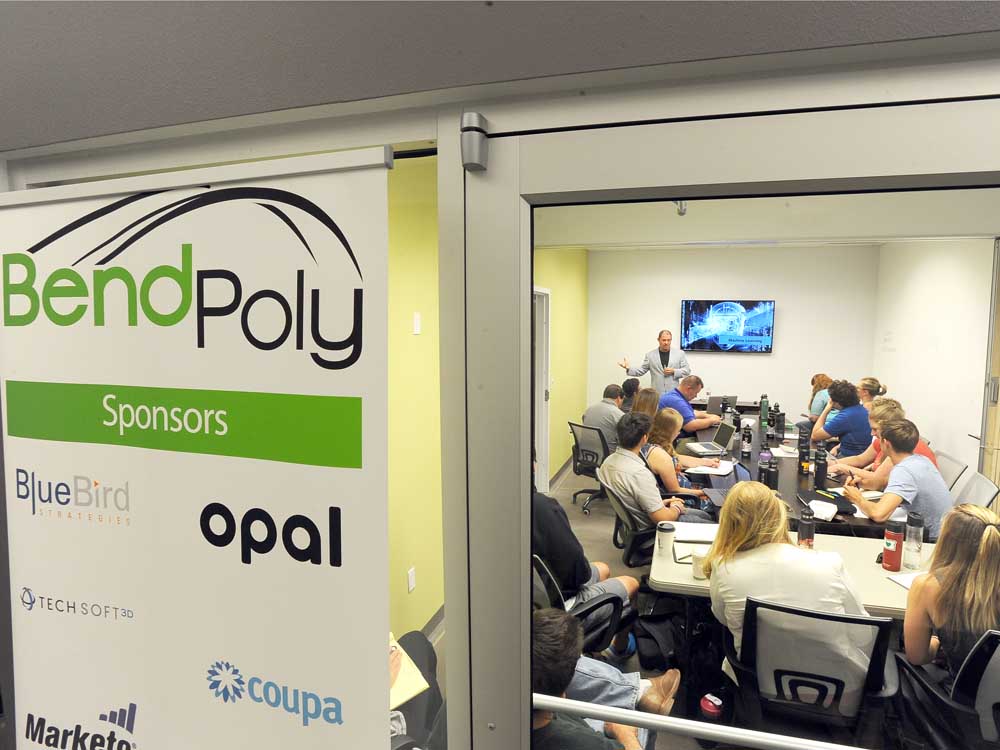BendPoly offers crash course on digital marketing
Published 12:00 am Wednesday, July 8, 2015

- Ryan Brennecke / Bulletin file photoStudents attending Bend Polytechnic Academy's inaugural program in July listen to a presentation at the 1001 Tech Center on SW Emkay Drive. Bend Poly will move to George Fox University in Newberg this summer.
Students crowded around a conference table full of water bottles and laptops and notebooks Tuesday morning, the dress code ranging from blazers to hoodies. At the head of the table, Jon Miller, co-founder of the digital marketing firm Marketo, was telling them how to succeed in the business: Be “NICE.”
That is: a numerical, intuitive, content-creating, execution machine.
This was day one of BendPoly, a six-week crash course on digital marketing for students and recent graduates billed as a “vocational bridge” between higher education and the tech industry. Founder Bruce Cleveland said the program set out to augment, not replace, a college or graduate degree, giving students hands-on experience with digital marketing software. In the final two weeks, students will design and run marketing campaigns.
“It’s a team sport when you build (tech) companies. You need people who can build products but you also need people who can market them and sell them,” said Cleveland, who splits time between the San Francisco area and Bend.
Many of the 16 students have liberal arts backgrounds. These are creative, articulate, critical thinkers looking for practical training to enter the tech world, where salaries can start at $70,000 to $100,000. Nearly all received scholarships to cover BendPoly’s $2,500 tuition.
Danny Kim, 34, is heading into his final year at University of Oregon’s concurrent J.D./MBA program and is looking to build a wide set of skills. Right now, digital marketing is his weakest link.
“I know bits and pieces of it but I didn’t know how it all came together,” he said, adding he hopes to fill in the gaps between “search engine optimization”” and “power bloggers.”
Jenny Palm, 31, just got her MBA from UO (students from the program make up about a third of BendPoly’s students this summer). She said she mostly learned about traditional marketing in school.
“We don’t have practical applications for it,” she said. “It’s theoretical versus practical.”
Back in class, Miller told students he studied physics in college before going to business school and entering the tech world, surviving the boom and bust and starting Marketo to create easy-to-buy and use marketing software. The company’s first product managed paid Google search results, helping clients test different ads and determine how much it would cost to get the most clicks.
It was a good but not great product, Miller said. “If you want to win, you really need great.”
The company continued to develop and grow, as did its sales; it went public in 2013. Now, in a crowded field competing with the likes of Oracle and IBM, Miller said Marketo has tried to position itself as software built by marketers for marketers.
Over the 20th century, he said, marketing has moved from selling a product to selling a brand, a message, a cause and a relationship between customer and company. From Facebook ads to email blasts, customers may feel overwhelmed.
“Clearly, being loud isn’t the right strategy,” Miller said.
Meanwhile, there’s more sources of information on customers — think cellphones that report their location, Twitter feeds that report whom they know and what they think. Miller said the goal is to use that information not to trick people into buying something but as a way to craft a more relevant message. Kim, the J.D./MBA student, asked about marketing tools that are so efficient they can be intrusive. What if a marketer can read the tea leaves and know a woman is pregnant before her family does?
Miller said marketers can’t presume to know everything about customers, that there is a line between relevant and creepy. He added another “C” to his “NICE” formula: “Don’t be creepy.”
— Reporter: 541-617-7837,
aspegman@bendbulletin.com






